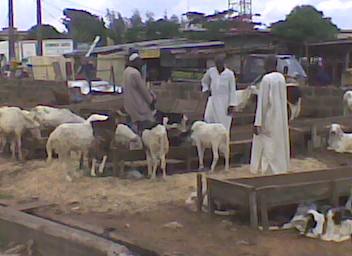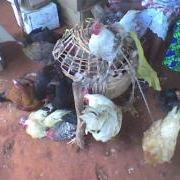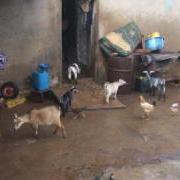Project Year
2010
Region(s)
West Africa
Country(ies)
Nigeria
Project Description
This study will focus on the importance of the role of livestock in the lives of households residing in rural areas of Nigeria. Livestock (especially small ruminants) provide the easiest and most readily accessible source of credit available to meet immediate household obligations. In southwest Nigeria, rural women are involved in the raising or rearing of small ruminants – sheep and goats especially around homes. This study examines the extent to which these small ruminants have assisted in meeting financial obligations of these women with a view to ensuring sustainability and possibly improving on the status quo.
Researcher(s)
Isaac B. Oluwatayo, Titilayo B. Oluwatayo
About the Researcher(s)
 Isaac Busayo Oluwatayo is a Lecturer in the Department of Agricultural Economics and Extension Services,
University of Ado-Ekiti, Nigeria. He is an agricultural/development economist with
extensive experience in rural welfare analysis, development policy, gender studies
and social protection issues. He obtained his PhD in Agricultural Economics from the
University of Ibadan, Nigeria. Isaac has been awarded a number of grants and fellowships
(academic and research) both locally and internationally. He has conducted research
and published extensively on poverty studies, food security, vulnerability and risk.
His current research interest spans climate change, rural livelihood, child and youth
studies and food policy analysis.
Isaac Busayo Oluwatayo is a Lecturer in the Department of Agricultural Economics and Extension Services,
University of Ado-Ekiti, Nigeria. He is an agricultural/development economist with
extensive experience in rural welfare analysis, development policy, gender studies
and social protection issues. He obtained his PhD in Agricultural Economics from the
University of Ibadan, Nigeria. Isaac has been awarded a number of grants and fellowships
(academic and research) both locally and internationally. He has conducted research
and published extensively on poverty studies, food security, vulnerability and risk.
His current research interest spans climate change, rural livelihood, child and youth
studies and food policy analysis.
 Mrs. Titilayo B. Oluwatayo holds a BSc and MSc in Animal Science from the University of Ibadan, Nigeria. She
likes raising poultry and small ruminants and has worked as a research assistant in
a number of poultry units within the Ibadan metropolis. As a teacher and researcher,
she enjoys practical demonstration in poultry enterprises and formulation of low-cost
feed. Mrs. Titilayo Oluwatayo is currently an employee of the Teaching Service Commission
(TESCOM), Oyo State Government, Nigeria.
Mrs. Titilayo B. Oluwatayo holds a BSc and MSc in Animal Science from the University of Ibadan, Nigeria. She
likes raising poultry and small ruminants and has worked as a research assistant in
a number of poultry units within the Ibadan metropolis. As a teacher and researcher,
she enjoys practical demonstration in poultry enterprises and formulation of low-cost
feed. Mrs. Titilayo Oluwatayo is currently an employee of the Teaching Service Commission
(TESCOM), Oyo State Government, Nigeria.
Synopsis of Research Results
Poverty in Nigeria is widespread and multi-dimensional. It is much higher in the rural areas where a greater proportion of the population lives. Women and young girls are the most vulnerable to poverty and this is not unconnected with their inability to exercise control over the use of productive resources like land and other valuable assets. Often times, they disproportionately find it difficult to access credit facilities especially from the formal financial institutions due largely to their low income base and the stringent conditions attached to it. African women farmers face enormous constraints toward increasing their productivity. They lack the means of production, have little or no access to those inputs that enhance productivity, are severely constrained in time and labor, and have almost no outlet to improve their human capital.
 However, small ruminants (sheep and goats) form an important economic and ecological
niche in the agricultural systems of rural communities across developing countries.
This is because small ruminants make a very valuable contribution to household income,
especially to the poor in the rural areas. The small size of sheep and goats has distinct
economic, managerial, and biological advantages. Economically, low individual values
mean a small initial investment and correspondingly small risk of loss by individual
deaths. Managerially, they are conveniently cared for by women and children, occupy
little housing space, have lower feed requirements, and supply both meat and milk
in quantities suitable for immediate family consumption. Small ruminants are biologically
more advantageous than larger animals. For example, sheep and goats appear to withstand
drought better than cattle. Their short reproductive cycle allows them to quickly
recover from rapid resumption of breeding following a drought or devastating disease
infestation. Thus, rearing of small ruminants provide the easiest and a readily accessible
source of credit available to women in order to meet immediate social and financial
obligations. In rural southwest Nigeria for instance, women are involved in the rearing
of these animals especially around homes by feeding them kitchen wastes or at times
allow them to graze on surrounding herbs and shrubs.
However, small ruminants (sheep and goats) form an important economic and ecological
niche in the agricultural systems of rural communities across developing countries.
This is because small ruminants make a very valuable contribution to household income,
especially to the poor in the rural areas. The small size of sheep and goats has distinct
economic, managerial, and biological advantages. Economically, low individual values
mean a small initial investment and correspondingly small risk of loss by individual
deaths. Managerially, they are conveniently cared for by women and children, occupy
little housing space, have lower feed requirements, and supply both meat and milk
in quantities suitable for immediate family consumption. Small ruminants are biologically
more advantageous than larger animals. For example, sheep and goats appear to withstand
drought better than cattle. Their short reproductive cycle allows them to quickly
recover from rapid resumption of breeding following a drought or devastating disease
infestation. Thus, rearing of small ruminants provide the easiest and a readily accessible
source of credit available to women in order to meet immediate social and financial
obligations. In rural southwest Nigeria for instance, women are involved in the rearing
of these animals especially around homes by feeding them kitchen wastes or at times
allow them to graze on surrounding herbs and shrubs. Occupational distribution of respondents shows the relatively high importance of farming
when compared with other occupations available in the study area. Thus, while more
than half of the respondents indicate agriculture as their main source of livelihood,
over two-third indicates farming as an alternative source of income. In other words,
farming remains the highest employer of labor among women in rural southwest Nigeria.
Moreover, analysis of respondents based on the types of livestock raised reveals goats
as the most preferred. This is largely due to its wide acceptability and ease of domestication
in terms of adaptability to the prevailing environmental conditions. Again, goat meat
is consumed by all households in the study area, and it has no religious or cultural
restrictions, which make it to be better placed among residents. Also, in terms of
marketability, goats are more attractable since it has higher rate of survival when
compared with other small ruminants/livestock. The second highest is poultry and this
is closely followed by sheep. Meanwhile, on the role that small ruminants play among
these women, respondents were given the freedom to express their minds and the responses
were summarised. Over two-third of respondents indicated that income realised from
small ruminants rearing helped them significantly in attending to welfare needs of
their members since income generated from other sources are not enough to cope with
increasing demands in the home front. A sizeable number reported that they rely on
income from small ruminants’ sales to pay children’s school fees and to smooth consumption
especially when there is scarcity of food resulting from lean harvest.
Occupational distribution of respondents shows the relatively high importance of farming
when compared with other occupations available in the study area. Thus, while more
than half of the respondents indicate agriculture as their main source of livelihood,
over two-third indicates farming as an alternative source of income. In other words,
farming remains the highest employer of labor among women in rural southwest Nigeria.
Moreover, analysis of respondents based on the types of livestock raised reveals goats
as the most preferred. This is largely due to its wide acceptability and ease of domestication
in terms of adaptability to the prevailing environmental conditions. Again, goat meat
is consumed by all households in the study area, and it has no religious or cultural
restrictions, which make it to be better placed among residents. Also, in terms of
marketability, goats are more attractable since it has higher rate of survival when
compared with other small ruminants/livestock. The second highest is poultry and this
is closely followed by sheep. Meanwhile, on the role that small ruminants play among
these women, respondents were given the freedom to express their minds and the responses
were summarised. Over two-third of respondents indicated that income realised from
small ruminants rearing helped them significantly in attending to welfare needs of
their members since income generated from other sources are not enough to cope with
increasing demands in the home front. A sizeable number reported that they rely on
income from small ruminants’ sales to pay children’s school fees and to smooth consumption
especially when there is scarcity of food resulting from lean harvest. It is however important to know that a notable enabler of small ruminants’ monetization
include being a member of social groups and associations (cooperatives in particular)
since this provides an avenue to showcase ones prowess and skills through participation
in regular meetings and getting to know the financial needs and positions of members.
Also, the issue of social capital in the form of trust and family ties confers some
degree of confidence in those ready to shoulder the financial needs of these women.
Some important constraints faced by these women include increased mortality of the
animals especially during the raining season, diseases and pest infestation, exorbitant
price charged by veterinary doctors which invariably add to production costs, inaccessible
credit facilities resulting from lack of collaterals, poor managerial skills and unstable
government policies.
It is however important to know that a notable enabler of small ruminants’ monetization
include being a member of social groups and associations (cooperatives in particular)
since this provides an avenue to showcase ones prowess and skills through participation
in regular meetings and getting to know the financial needs and positions of members.
Also, the issue of social capital in the form of trust and family ties confers some
degree of confidence in those ready to shoulder the financial needs of these women.
Some important constraints faced by these women include increased mortality of the
animals especially during the raining season, diseases and pest infestation, exorbitant
price charged by veterinary doctors which invariably add to production costs, inaccessible
credit facilities resulting from lack of collaterals, poor managerial skills and unstable
government policies.


